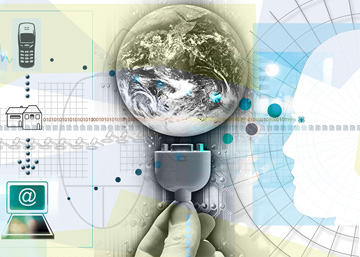IT, Education and Culture
Some contemporary thinkers believe that in the future the use of IT will shift from business to education. If this happens it will be a welcome trend. But the nature of the impact of such a shift depends on the values and vision of education. If the aim of education is predominantly utilitarian, or controlled by commercial motives or the interests of business then there is not likely to be any qualitative change in society. This article examines what is the type of education which can bring a true change in society and how IT can help in this task.
At present there is a growing demand and pressure on the educational system to create a system of education, which will prepare the individual for the “New Economy”. We must note here that the demand is not for a system of education which will prepare the individual for the whole of life or to create a better human being but to provide skilled employees and great entrepreneurs to run and lead the “New Economy”, as if human society is nothing but economics, business and commerce! But human society also has other important organs like culture, religion, education and politics, which also need good workers and great leaders. Our society needs great teachers and educators, efficient and honest administrators, and great statesmen. It also needs great thinkers, artists, philosophers, saints and sages to provide creative ideas and higher values. A holistic system of education must be able to serve the knowledge-needs of these other organs of the society.
But the present social consciousness is not very much interested in the development of these other organs of the society because it is dominated by the temperament, mentality and values of the commercial man. Here again, we are not making any moral judgement on the present condition of the society but only describing the fact of the present society. For such may be the evolutionary needs of the present age.
But as the human society evolves and moves on to a higher level of consciousness, the power-balance between the different organs of the society will begin to radically change and herald the true knowledge-society, which we are talking about. In this knowledge-society of the future, the dominant social organs will be those institutions of culture, education and spirituality, which will impart the knowledge that will lead to the higher evolution of humanity in the mental, moral and spiritual dimensions of life. And the other organs like business and politics will play a subordinate and supportive role to the dominant organ of culture.
But this scenario we are sketching is not entirely futuristic. In almost all ancient civilisations the dominant social organs were not business but religion, culture and politics. For example, in the golden era of the Vedic age in ancient India, the entire society aspired for spiritual knowledge, which liberates the soul. In the ancient Indian Upanishads, we can find descriptions of people from every section of society seeking spiritual knowledge. There are in them descriptions of king-sages giving spiritual instructions to high-caste brahmin seekers; a poor cart-driver, who is an illumined yogi, instructing a king on spiritual knowledge; a wealthy merchant belonging to the low-caste and an illegitimate child of a woman who tells her son that she “knows not who was his father”, seeking for spiritual knowledge. We are perhaps moving towards a similar type of knowledge-society in the future. But the future humanity will be more intellectually and technologically advanced than the vedic age. There will be a more systematic and scientific approach to spiritual knowledge and an attempt towards a more extensive and widespread diffusion and application of spiritual knowledge for the enrichment of the whole life of man. And Information Technology in this future society will be an instrument of education and culture for disseminating this higher knowledge to the society.
Here comes some of the unique potentialities of IT. Among all technologies human mind has invented so far, IT along with the modern communication technology has the highest potential to make knowledge the dominant motive of human life and herald the true knowledge-society. For the modern information-communication-entertainment technologies – (ICE as they are called now) with the audio-visual aids and techniques like the multimedia, graphics, animation, etc. can make knowledge and learning a joyful, interesting and entertaining activity. In fact, ICE technologies can convert education into entertainment and entertainment into education. In the eastern spiritual tradition there is a precious body of psychological and spiritual knowledge which can steer the higher and future evolution of humanity towards its spiritual destiny in a higher consciousness. ICE technologies have the potential to impart this higher knowledge in a very effective manner, through concrete multi-sensory symbols, images and stories. When this happens, it can bring immense benefit to humanity.
Modern business is using IT not only extensively but also with great enterprise, dynamism, creativity and innovation. If IT is used with the same enterprise and creativity in education, human development and health care and spirituality, it can have a much more positive impact on humanity. For this to happen there has to be an elevation in the motives and values and vision of humanity to a higher level, towards those higher motives, which will lead to the fulfillment of the evolutionary destiny of humanity and the planet earth.
M.S. Srinivasan
The author is a Research Associate at Sri Aurobindo Society and on the editorial board of Fourth Dimension Inc. His major areas of interest are Management and Indian Culture.

